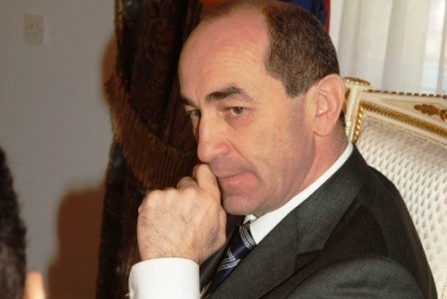Robert Kocharyan, “It doesn’t make to sense to debate with someone, who has been justifying his failures with the actions of the predecessors”

Before the holidays 2rd.am addressed a few questions to the RA second president Robert Kocharyan and received answers through his office and they received a promise that Kocharyan would answer the rest of the questions in the near future. Having considered the fact that the December 30 interview of the 2nd president has become a sound topic for discussion and the dual response of Premier Tigran Sargsyan, we also decided to send our own question. Today we received those answers and for that we thank both Mr. Kocharyan and his staff.
-Mr. President, what is your opinion about the gas agreement between Russia and Armenia that has attained such a big resonance in the media?
-All the issues can be resolved into the following: concealment of the real gas price, which led to a $300,000,000 debt, sale of the Armenian government’s 20% share in ArmRusGasProm, monopoly the Russian side to hold until 2043 under the agreement.
1. As to the concealment of the real gas price from the public, I cannot understand the government’s logic, which caused a huge debt to form. Gas was obviously supplied to Armenia at a price that was much lower than that fixed for gas consumers. Customs invoices were evidence thereof, and the problem received wide press coverage. From the very beginning the government would have to give explanations as the law did not allow it to ‘do without Parliament.’ They must have hoped to agree on different prices with GazProm, but failed. The result was an unpleasant experience, with damage to the government’s reputation. The parliamentary debates made depressing impression. The government failed to provide convincing arguments. Apologizing would have been easier for them. Even some of the ruling party’s MPs were embarrassed in voting for the agreement.
The public perception of the agreement was seriously affected. The public is well aware of politicians’ unscrupulousness, but the cunning behavior of one of the branches of power in public is just shocking. Unfortunately, Armenia has never been known for popular confidence in government institutions, except for the army, and such events destroy what has remained of it. I am sure the government should have from the outset informed the public of the rising gas price and of the government’s steps to resolve the problem.
2. As to the sale of the 20% share in ArmRusGasProm. The company was originally co-founded by Armenia’s Ministry of Energy, GazProm and ITERA, with their respective shares of 45%, 45% and 10%. The board of directors was formed in proportion to their shares, with a GazProm representative appointed chairman of the board of directors, and Armenia’s representative appointed as executive director.
The company was actually managed by Armenia’s representative. Later, after GazProm made large investments in the 5th power unit and Iran-Armenia gas pipeline, the proportion shares changed (20% to 80%) as the Armenian side had no share in the investments (earlier GazProm acquired ITERA’s share). However, Armenia’s representatives continued to be appointed as ArmRusGasProm executive directors. It was an asymmetric (in Armenia’s favor) share in the company management. Now that Armenia has sold its share, it only has the observer status at meetings of the Board of Directors. Following the business logic, Armenia lost its influence, but for the exclusive rights granted the natural monopolist until 2043.
3. Exclusive terms for the monopolist’s activities until 2043. This is a most vulnerable part of the agreement. I could not find similar examples in international practice. And this process is under way when the world oil and gas industry, world energy industry, has entered a stage of dynamic changes. In the foreseeable future it may require legislative amendments, serious revision of approaches to energy. Will Armenia’s energy sector prove to be a hostage to the agreement? Recall ArmenTel. The situation is much more serious. The agreement made Armenia’s government observer not only at the ArmRusGasProm Board of Director, but also in Armenia’s gas sector. I have 10-year fruitful experience of cooperation with GazProm. The result was large-scale gas supply throughout Armenia, enlargement of underground gas storages, construction of the 5th power unit of the Hrazdan HPP, Armenia-Iran gas pipeline and 10-year-long steady supply of gas to Armenia at a reasonable price. Never did GazProm set any such terms nor did any such talks seem appropriate, with investments in Armenia’s economy totaling hundreds of millions. As to why this has happened now, I cannot understand. No explanations have been given.
-Mr. President, the adoption of the compulsory pension accumulation system mounted a big wave of tension in the country. What is your attitude to that? Was the possibility of its enforcement discussed during your tenure?
– A short background, to begin with. The question was actively discussed in 2004-2005 upon the initiative of Armenia’s Central Bank. The debates, as a matter of fact, saw a resistance between the Government and the Central bank, as the Government’s joint position was against the introduction of an accumulation fund. Extended working consultations were held in my office with the participation of the prime minister, individuals in charge of the Government’s economic bloc and representatives of the Central Bank. The international experience was discussed to assess the reforms’ risks and impacts on Armenia’s general economic situation.
The Government had less convincing arguments than did the CB. And, by the way, it was the Government that had to implement the reforms, not the Central Bank. Hence to impose on the Government a reform in opposition to its beliefs would have been wrong. Therefore, a decision was made not to introduce a compulsory pension insurance system and thus remain within the parameters of the European pension insurance model which is based on the generation solidarity principle. That, by the way, is not about a good or bad choice of a model. Both models have their advantages and disadvantages and successful or unsuccessful experience of implementation in different countries. That has to do with the choice of a model that best corresponds to the given country’s background. Accumulation funds have the most widespread application in the United States where the market development helps effectively manage the accumulations. There’s a double effect here; money works for both the citizen and the country’s economy. What’s the situation in Armenia now? On the one hand, the ageing population and its active classes’ migration from the country deteriorate the proportionality between the employed population and pensioners. On the other hand, the poverty growth makes the allocations for accumulations funds extremely tangible for the employed young population, essentially deteriorating their financial situation. The debates proved that the government’s participation is not a sufficient motive for the young, given the long-lasting nature of the reform and the big deficit of trust. In the meantime, they are, some way or another, the taxpayers’ sums. Armenia does not practically have a fund market, so obviously, the accumulated resources will be given to the Government in large part through an acquisition of debt liabilities. The Government now has a good chance to increase the borrowings internally and will be probably enthusiastic about that. The remaining part of the resources will be exported from Armenia because we do not have enough tools to manage them. It can hardly be considered a positive factor for the country’s economy (given the considerable debt that already exists). There’s no miracle decision here as such. It is obvious only that good paces of the economy and a higher level of the population’s employment would have essentially abated the tension.
The biggest problem, I think, is the volatility of the financial markets’ growth, which increase the risks of both managing the accumulated resources and experiencing their partial loss. The recent crisis caused many pension funds to lose serious amounts, so there is no guarantee that the scenario will not repeat itself. The Republic of Armenia Government does not have enough means to make up for such losses. A budgetary guarantee is an argument only for the naïve. As to how effectively the population’s means will be managed, it’s a big question. This much about the pension reforms at large. I don’t want to delve into the controversial details of the adopted law. Opponents of the Government have much talked about it both in both the National Assembly and in articles published in the press. I think many of those remarks have to be attended to. Only time will show if the Government did the right thing by initiating the compulsory pension reforms. The specificity of that reform is unfortunately its long-lasting nature, so when problems arise, very few will remember the authors. My attitude to the adopted law is negative, given the high likelihood of a failure that may see our citizens lose their means. It is possible to retroactively model the situation to calculate what losses our population would have suffered in the aftermath of the 2008 crisis had we introduced the compulsory accumulation system in 2005. I would have no room for an apology then. And crises recur from time to time, and that, as a rule, happens when nobody expects them.
– Your holiday eve interview to our website has created a big resonance in the political arena. Many of experts and journalists tend to believe that this is your intention for political comeback. Besides, the media constantly writes about your argument with the Prime Minister and this is even more highlighted in light of the last week article of Prime Minister, in which he allegedly adverted to your criticism on the “construction balloon.” What can you say about that? And was your December interview really an attempt to return to politics?
– First, let me speak about the last article with vivid color tables.
The prime minister had better say nothing. If you have so many mortgages, why do you have so little construction? If we believe in figures, then the conclusion from the article is one: despite the stable growth of mortgage and improvement of its conditions, we have less and less construction. But it only strengthens the main arguments of my interview and not refutes them,” he emphasized. But I am not inclined to believe in those numbers.
There is a big portion of slyness in it.
1. The data included in the table are far from the real pictures of the mortgage market. These fake and exaggerated numbers do not in any way conduce to the increase of the actual raise of construction. For the banks this is a temporary way of the tough situation. We can have certain understanding to this for the sake of stability of banks. But here there is cynicism and derision because we need to be cautious from that. It is a result of an unhealthy economy and we shouldn’t be proud of it.
2. The figures of various years are correct to compare only with comparative numbers. A person, who makes judgments based on “economic categories” should know that.
It pertains both to the volumes of mortgages and the capital expenses. 3. In the first table we can see a very interesting thing. It turns out in 2009 we had 18,5% slump and not 14,1% as our statistics would claim. If it is so then with the rates of economic reduction we occupy not the second but the first place. I congratulate the Prime Minister. Now let me speak of the incentives of my interview. I have spoken and will continue speaking of the key issues of Armenia irrespective of my plans to return to politics.
I cannot sit and indifferently watch the accumulated issues of the country and honestly express my opinion. Perhaps sometimes the truth may sound bitter. But I am not going to start a debate with the Prime Minister. His last article shows that he is hopeless. It is pointless to debate with someone who has spent the past six years constantly justifying his failings with his predecessors’ actions. The main criterion for evaluating the work of any government is very simple: have the people become better-off or worse off under that government. No trick can help them here. People judge their living standards not based on their tables on statistics but relying on their day-to-day lives.

























